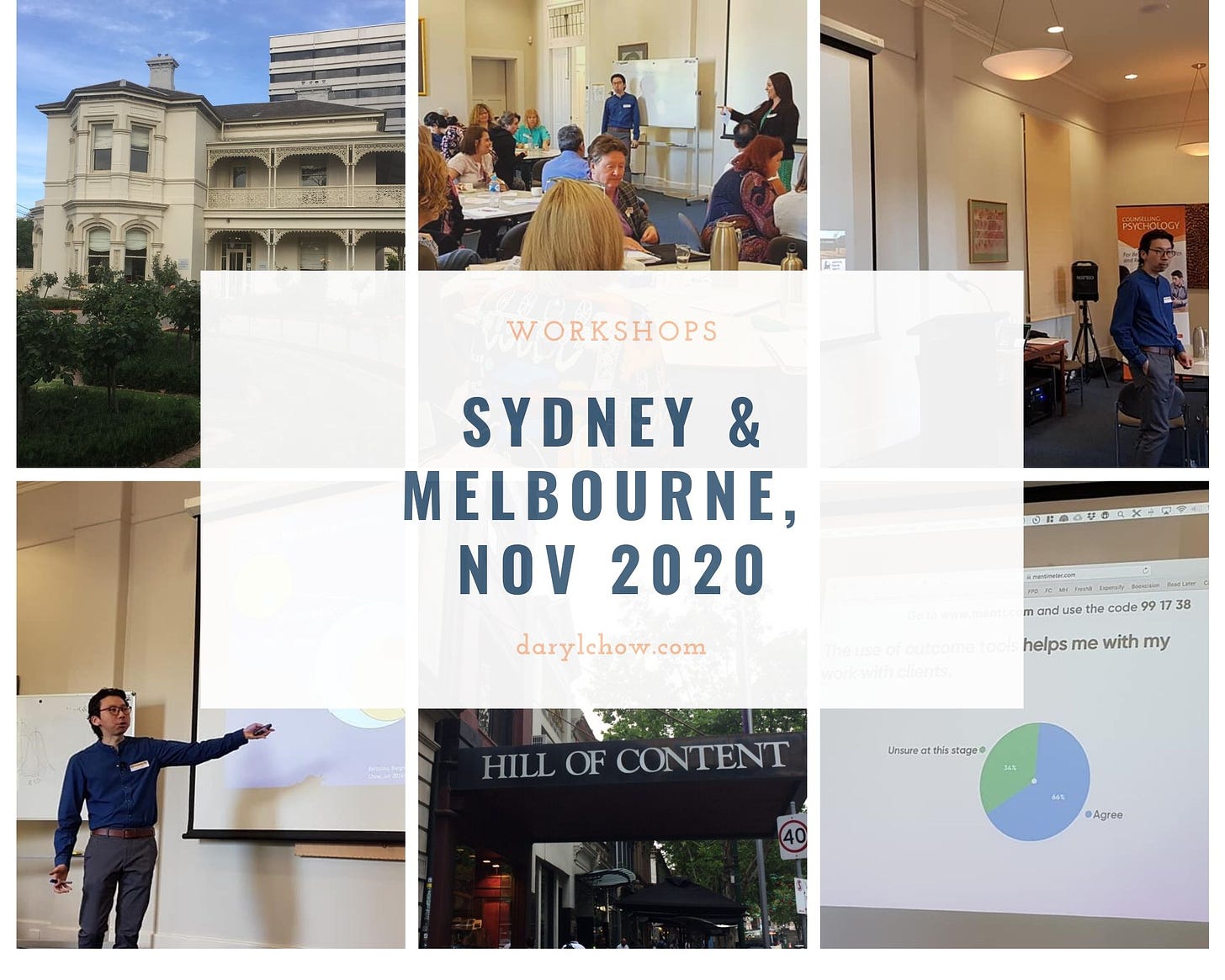ON THE FRONTIER: Frontiers of Psychotherapist Newsletter Oct'19.

Hi Folks on the Frontier,
Three big thank you's for the month of Nov 19:
1. Big thanks to the Anita McGregor and the folks from University of New South Wales (UNSW) Forensic and Clinical Masters program in Sydney for having me for 2 intensive days of workshop. You are truly at the leading edge, helping your students off to a good start in the profession.
2. I'm also really grateful to the Australian Psychological Society (APS) College of Counselling Psychology for having me run a day long training in Melbourne. The response I've been getting from participants over email has been really encouraging.
3. Thank you to Miguel Lopez from Australian Centre for Grief and Bereavement for coming to hang out with me when I was in Melbourne. I've learned so much from you especially regarding coaching football (or soccer as we call it in Aussie land). Will definitely check out Pep Gurdiola.

For this month's newsletter:
1. Recent articles from my desk;
2. Current Books I'm Reading
3. Cutting Edge New Course.
FROM MY DESK
Recent Blog Posts:
Note: The following blog posts are from my other site, Full Circles: Reflections on Living
“Will You Forgive Me?”
Recalculating
Is “How Are You?” A Greeting or a Real Question?
“The biggest questions have already been answered”
Current Book Readings
I get asked the books that I'm reading. It's abit of an excitement and embarrassment when I share what I'm currently reading. It's exciting because I love to share and hear people's thoughts around certain ideas, but it's slightly embarrassing because I'm so scattered in my reading list.
That said, I do have a current "primary reading" and the rest are secondary, until I finish the primary book. Here are the current 7 books on my mind.
1. The Secret Network of Nature by Peter Wohleben
I know so little about the nature sciences, but have always been intrigued by the systems thinking, cybernetics and biomimicry. I picked up this book because of Wohleben's previous book The Hidden Life of Trees.
The first chapter details the impact of wolves in the Yellowstone National Park, and how when they were removed, it affected the plantation and river.
Brings home the point on how we are indeed interconnected.
2. Learning from The Octopus by Rafe Sagarin
This book is not just about octopus (although it's an excellent creature to study)
From Sagarin: ... a common misconception about evolution is that it is about seeking perfection, as encapsulated in the term survival of the fittest. This misinterpretation arises from misguided applications of Darwinian thought, such as eugenics, and it is reflected in more legitimate societal applications such as business performance analyses where “optimization” is seen as a laudable goal. In fact, evolution is neither about survival of the “fittest” nor about optimizing systems.
3. Letters to a Young Poet, but Rainer Maria Rilke
Bought this at one of my favorite bookstores in Melbourne, Hill of Content.
This feels as if Rilke is writing to me, not just about poetry, but about the importance of creating work that brings life to others.
4. UltraLearning by Scott Young
This is my current primary reading at the moment. I've been on Scott Young's Rapid Learning course and wanted to check out his new book. His book, let me to more readings...
5. The Case Against Education by Bryan Kaplan
...One of the two books is this book. I'm reading this as I'm researching for the series I'm writing on Reimagining Education in Psychotherapy (REP). Scholarly and thought provoking.
6. Transfer of Learning by Robert Haskell
... the second book sprout from Scott Young's Ultralearning is this. It's a disturbing read. In gist, Haskell points out a sobering evidence that what we learn in one context, does not often "transfer" to another situation. This violates psychology first law, which is Roger Shepard says it's a "law of generalisation."
Why isn't transfer of learning happening??
I'm still reading this gripping book.
7. Five Minds for the Future by Howard Gardner
This is an old book, but I'm particularly intrigued on Gardner's 3 out of the five mindsets: Creating, Synthesising, and Ethical Minds.
What is striking is that a "synthesising mind" requires analogical thinking i.e. transfer of learning as pointed out by Robert Haskell.
“It is utterly false and cruelly arbitrary to put all the play and learning into childhood, all the work into middle age, and all the regrets into old age..” ~ Margaret Mead.
NEW CUTTING EDGE ONLINE TRAINING
For the past year, I've been working on building a unique and in-depth course called DEEP LEARNER. It's what the name describes. I wanna help professionals like you extend your mind and develop a way to become a deep learner. I'd provide you all the tools, skills and design principles to make this happen.
If you are interested in this, pls drop me an email to be on the waitlist when it releases in a few month's time. For the first 20 sign-ups to the waitlist, you'd be give a special trusted 40% off the full price $485. One-time fee for a life time access
Thanks!

If you have any comments or questions you love for me to blog about, let me know!
You can reach me at info@darylchow.com
Blessings,
Daryl
Daryl Chow, MA. Ph.D. (Psych)
Senior Associate & Trainer, International Center for Clinical Excellence (ICCE);
Endorsed Counselling Psychologist & Board Approved Supervisor (Aus),
Henry Street Centre, Fremantle, W Australia.
Senior Psychologist (on locum),
Institute of Mental Health, Singapore.
You are receiving this because you are a subscriber to the Frontiers of Professional Development (FPD) blog. I want to keep you up to date on some developments that you will find useful. You might also be interested to check out the previous FPD Newsletters for useful and practical resources. Alternatively, there's our Facebook group to connect. Please spread the love to others who are like you—devoted to your professional development.
Please unsubscribe if this is not for you. The last thing I want if for you to feel spammed. No hard feelings.



